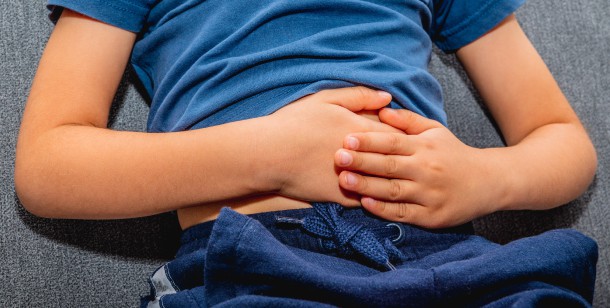Whether it be at school or in the workplace, you’ve likely heard the phrase: “There’s a stomach bug going around.” But that vague term could mean anything from a simple stomach ache to full-on food poisoning. And because they all have very similar symptoms, it may be difficult for you to discern what exactly you or your child are afflicted with. Keep reading to learn what is the difference between stomach flu and food poisoning, and learn more about how to treat the symptoms.

How Do I Know if it’s Food Poisoning or a Stomach Virus?
If you are experiencing a severe upset stomach, but aren’t sure whether it’s the stomach flu or food poisoning, there are a few ways you can tell the difference.
Causes
- Both food poisoning and the stomach virus can be caused by a virus. However, food poisoning can also be caused by bacteria and parasites.
Incubation Period
- For people that have contracted the stomach virus, or viral gastroenteritis, it may take a while for symptoms to present themselves, with infected individuals often not exhibiting any issues until 24 to 48 hours after exposure to the virus.
- For people with food poisoning, they often experience symptoms as soon as 2-6 hours after eating contaminated food.
Symptoms
- If you have a stomach virus, you are likely to experience one or more of the following symptoms:
- Diarrhea
- Stomach/Intestinal cramps
- Nausea & Vomiting
- Fever
- Weight Loss
- If you have food poisoning, the symptoms are as follows:
- Diarrhea
- Fever
- Vomiting
- Fatigue
- General Malaise
- Muscle Aches
- Headache
- Sweating
- Eye Swelling
- Difficulty Breathing
- Thirst
Because both illnesses share the same symptoms, it’s important that you self-evaluate and try to figure out when and how you contracted the illness. If it was almost immediately following a meal, then it’s probably safe to say that you have food poisoning. But if you know there has been a stomach virus going around and you’ve come into contact with someone who is sick, you may have a stomach virus.

How Long Does Food Poisoning Last?
Generally, food poisoning can last anywhere between 1-10 days. But if for whatever reason your symptoms present later than usual, you could have food poisoning for up to 4 weeks.

How Long Does the Stomach Flu Last?
Depending on the cause of the viral infection, symptoms may appear between 1-3 days after you’re infected; the symptoms usually don’t last more than a few days, but can persist up to 10 days in severe cases.

How to Prevent Food Poisoning
Because food poisoning is most commonly caused by eating raw meat or otherwise contaminated food, here are some tips to avoid getting sick:
- Observe proper cooking temperature
- Maintain a clean kitchen
- Check the expiration dates before buying food
During the holiday season, it is especially important that you take care of what you eat at other peoples’ homes. Not everyone has the same standards of kitchen hygiene as you, so if something looks off with the food, it’s probably best not to eat it.

What Should I Eat if I Have the Stomach Flu or Food Poisoning?
If you have either food poisoning or the stomach flu, odds are that you don’t have much of an appetite. However, it’s essential that you get enough nutrients into your system to help your body fight the illness and recover. As a rule of thumb, it’s probably best to eat soup or oatmeal for the first day or so. Once you feel up to expanding your menu, opt for bland, mild foods; bananas, ricerise, applesauce, potatoes, porridge, or crackers are all good choices. You might also consider adding some fresh ginger or mint to your diet, as they are both known to help soothe an upset stomach. Conversely, you should try to avoid foods high in dairy, fiber, fat, and sugar. You should also avoid eating raw meat like sushi. These types of foods are more likely to upset your stomach and cause bowel issues.
It’s also important to prevent dehydration. Sports drinks are excellent for replenishing your body with electrolytes.
When to See a Doctor
For both food poisoning and stomach flu, symptoms typically don’t last more than a few days. If this is the case, then you can likely just treat your symptoms at home. But if you find that your symptoms have not lessened or gotten worse after a few days, you might need to seek medical advice. Additionally, if you experience symptoms like bloody stool, weakness, dizziness, or an excessive fever, you need to seek emergency care immediately.
Visit Village Emergency Centers Today
At Village Emergency Centers, we understand the discomfort and uncertainty that goes along with illnesses like food poisoning and the stomach flu. Not only do they severely inhibit your everyday life but they are also potentially very dangerous. If you have an upset stomach and want to know what is the difference between stomach flu and food poisoning, do not hesitate to contact a Village Emergency Center near you. We have locations across the Greater Houston area and are ready to serve you; our doctors and facilities are fully trained and equipped to handle all of your emergency needs. Contact us today for outstanding medical attention.
